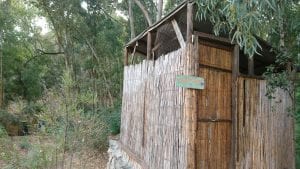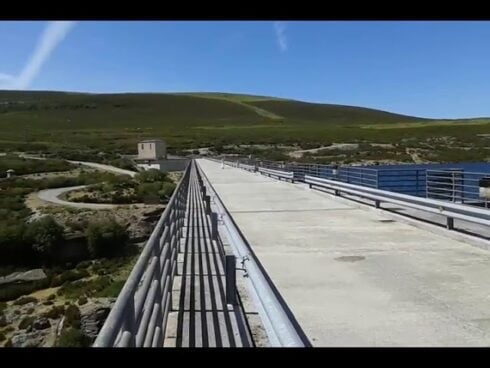Following last month’s police raid on a long-time hippy colony near Granada, the Olive Press sent Jed Neill to discover whether these New Age veterans are spreading more than peace and love

THEY have lived in the valley since the 1980s – a disparate collection of European dropouts hoping to find a better way of life in the countryside of Granada.
Ironically the Beneficio hippy commune, near the town of Orgiva, is not far from the finca where Driving Over Lemons author Chris Stewart famously found his own personal Nirvana.
But last month police turned over the New Age camp, said to be the oldest in Spain.
In a shocking official police statement, reported in the Olive Press, they seized 2,300 marijuana plants, issued 103 criminal charges and made 24 arrests – including a man on the wanted list for strangling his wife in France.
Pictures showed a team of Guardia Civil loaded up with haywains of marijuana on their shoulders, while the story made national news and completely stunned the otherwise peaceful Alpujarras region, known for its healthy mix of locals and expats and famed for its spirituality, yoga retreats and breathtaking countryside.

And so it was with a tainted view that I sat down with members of this 700-strong community to hear their side to the story and discover whether what we are told and what actually happened are two competing truths.
When you enter the camp – a kilometre up a dirt track from the small village of Canar – the first thing that strikes you is the collection of battered vehicles adorned with graffiti and home-made banners saying ‘pick up your rubbish.’
This curious jumble of real estate is prized like any home. The various tents and wooden huts are scattered around trees and the community certainly doesn’t seem in any way dangerous.
Bubba, the community’s dreadlocked soothsayer, a Dutchman, is quick to inform me that in last month’s raid, only five people were actually arrested by police, not 24.
He adds that only around 150 marijuana plants were taken, not thousands, as the police report exclaimed.

In any case, he insists this is hardly a crime. He explains that marijuana is treated as a sacred plant in the camp and there is a broad consensus that alcohol, not pot, is the sum of the community’s problems, triggering two violent incidents in the camp this year alone.
Alcohol (as well as curiously dogs) was once supposedly banned in the community.
This ‘rainbow family’ uses one central instrument for governance – the Talking Circle.
When an issue arises, people sit down together and only the person with the talking stick can speak; the others have to wait for the stick to be passed to them. It stops arguments breaking out.
The elders inform me it is a ‘multidimensional way’ of ironing out problems which mostly end in a familial hug to strengthen their bond as brothers and sisters.
Bubba, well into his 60s and with a Spanish wife, brushes off questions about getting bored in Beneficio saying, ‘I’ve got enough memories for three or four lives, so I never get bored.’
Meanwhile Joe, a 50-year-old former office worker from Austria doesn’t worry about being bored or lonely either, saying ‘If I wanted to be busy I’d get myself a job.’
Next up I talk to Chris, a 66-year-old from Nottingham, widely considered to be an ‘original elder’, who lives in a well-crafted shack, with a fireplace and homely kitchen. Indeed, charm personified.
“I am living outside the system,” explains the eloquent elder, who has been living on/off at the commune for a decade, supporting himself with a string of odd jobs.
Lighting a joint, he warily selects his words (he insists he has never been interviewed before) while watching the smoke curl upwards.

“It is a spiritual organisation. We’re a European gathering, part of a world-wide family,” he tells me. “We used to make weapons to fight wars, now wars are made to make weapons,” he adds philosophically, paraphrasing best-selling author Arundhati Roy.
Over a game of chess later that evening, the modern-day Gandhi, opines that religion is a dangerous tool ‘because of the dual morality at its core’ and to be truly free ‘one must reject all monied possessions’. He has a point.
A local Canar resident, one of a few I spoke to, who were fairly supportive of the community, Nayet, 31, tells me: “Some people really love it, others not so much. It depends on the person. It’s great for people who have no one, they accept everyone.”
Yet it is this acceptance of anyone moving there that has dealt the community its ultimate blow.
The raid would never have happened, after all, but for an Interpol report that the community was harbouring a wanted fugitive, unbeknown to them, they claim.
It was a local police report about the alleged rape of an American member, earlier this year, that led to police to investigate further into the Frenchman.
“I am not sure the rape actually even happened,” says Chris. “It was something gossiped about within the community, but apparently with little real evidence.

“What is true is he was definitely fairly creepy and people tried to avoid him. But that does not make him guilty and we didn’t know about the claims in France.”
Chris does however add that ‘more often than not’ the commune is ‘a doctor’s waiting room for the mentally unbalanced.’
This is certainly apparent from the vacant stares from some commune members … people who seem to do nothing all day but follow the the sun’s trajectory over their hillside.
However, despite the odd drug-addled gargoyle, you feel increasingly welcome the longer you stay here because you are left to your own devices without being fully forgotten.
The commune is made up of structured pathways that snake around the camp, and a stream running through it which supplies drinking water.
The further up the hill you go, the more robust the buildings are. At the very top, I encounter a German family living in two tents with two teenage boys who are covered in dirt.
Grinding her teeth, the mother informs me they were fed up with Germany’s open door policy and moved here to escape job competition.
“The system in Germany is broken. there are too many immigrants,” she says, perhaps ironically.
The father, a former computer engineer, takes his two boys to the camp’s community school from Monday to Thursday.
He tells me that 25 children attend the weekly classes where a traditional curriculum – including Maths, English and Science – is taught by three ‘teachers’ in English, Spanish and German.
During the raid, which he describes as undeserved, the police damaged one of their tents and stole a machete they had been using for home improvements.
Another resident believes the writing could be on the wall for the community and the group may soon be sent off to the winds.
It comes as during the police raid, officers took photos and measurements to sketch out a census of the community. “I’ve been here for four months and that was the first time I saw something like that. It’s a bad omen.”
The truth is that to survive in Beneficio, you have to be resilient, hardened by your own ideals and with a clairvoyant picture that this life is better than the one you left behind in the country you once called home.











